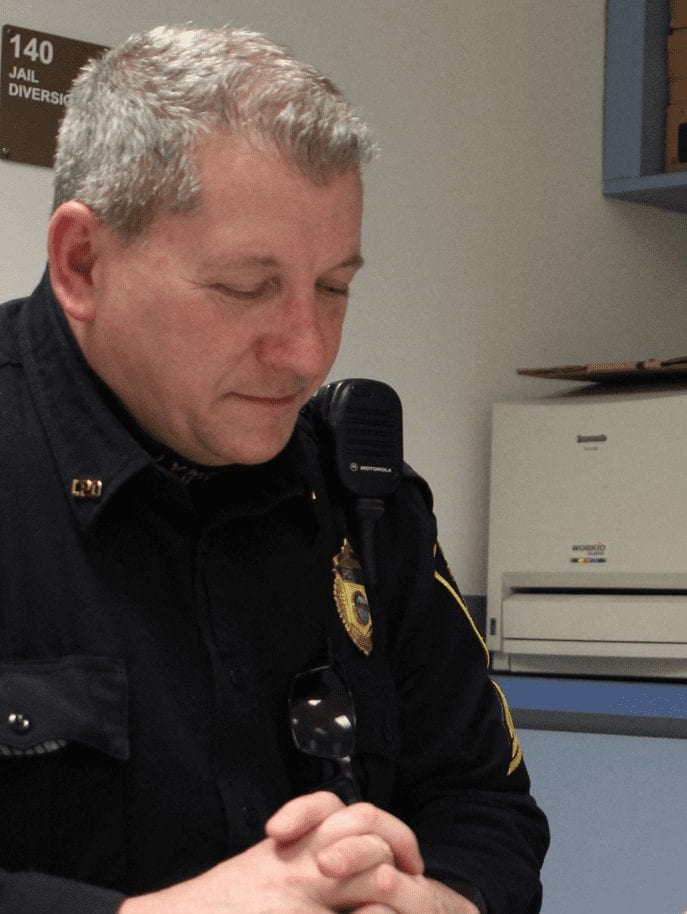Item Photo By OWEN O’ROURKE
Lynn Police Sgt. Dave McEnaney goes over a case with Erin Zapata, of the Behavioral Health Unit, at the Lynn Police Station.
By STEVE KRAUSE
LYNN — December was a bad month for heroin overdoses, says Lynn Police Chief Kevin F. Coppinger.
He might as well extend that. The whole year has been terrible. Through November there were 32 fatalities due to drugs, and 305 overdoses. And Coppinger said that in the first two weeks of December, there were 10 overdoses, five of them fatal.
“We’re getting our butts kicked,” Coppinger said. “We’re in another one of those spirals. We had one in the spring. It calms down a bit, then it spikes.”
In an effort to be more proactive than reactive, the police department established the Behavioral Health Unit last year, and has given it space within the police station. The three-person staff acts as a kind of clearing house to see that offenders who might need help beyond what police officers can give them can get it.
And although the brunt of its cases these days are drug-related, the unit handles other incidents too, such as mental health and chronic alcoholism — as well as the problems that are related to them.
“Our goal,” says Jen Waczkowski, a clinician who works 16 hours a week under a grant through the Mass. Department of Public Health, “is to help give people the police come in contact with the services they require, or more support.”
Waczkowski is one of three who works in the center, which is located in the rear of the first floor of the police station on Washington Street. The others are full-timers Erin Zapata and Tito Rodriguez, both with the BHU, thanks to a one-time grant through the Massachusetts Attorney General’s office.
Together, the three try to steer offenders, especially those who haven’t become repeat offenders, toward getting help.
“We just finished up our first year,” said Coppinger. “It’s been a positive experience, because officers will refer a lot of people to the BHU. Hopefully, we’re doing good to save lives.
“It’s the same thing with mental health,” he said. “One of the big goals is jail diversion. The more we can do to get these folks decent treatment the less cases we’re putting through district court.”
At the same time, Coppinger said, “we are also freeing up valuable police resources to go out and do other things.”
Despite the presence of the BHU, Coppinger said some cases still result in incarceration.
“Sometimes,” he said, “we don’t have an option. We’re called to a disturbance and people are acting out. And we have to make an arrest.”
Lest anyone think that all the BHU does is sit in a suite of offices and wait for cases, think again. The members are out there. And while at this point, there’s only a day shift, it doesn’t mean there’s nothing to do.
“There are times,” said Zapata, “when we’re out riding in the cruisers to see if we can de-escalate situations. We go to where our assistance is needed.”
Most of the time, though, the BHU acts as a referral service.
“We try to steer them toward harm-reduction, 12-step programs, counseling on learning how to cope with stress, and to family support groups,” said Zapata.
““Our main goal,” she said, “is to take on cases and stabilize situations, and to see if we can offer people treatment.”
“We’re planting seeds,” said Rodriguez, a veteran social worker. “You may not be ready for treatment now, but we let people know we’re here when they are.”
All of this, Coppinger says, helps his people do their jobs.
“If they’re addressing individual needs, and not dragging people through the courts, it’s a win-win situation,” he said.
Still, the drug issue overrides everything, he says, because its tentacles reach into so many places.
“Every time we make a prostitution arrest, we refer it to the BHU,” he said. “A good number of prostitutes are addicts. The BHU will follow up, do well-being checks, and it has a bi-weekly support group.
The BHU also does well-being checks in mental health cases, particularly if it sees a tendency toward cases being suicidal.
“That’s when we’ll reach out to them,” said Zapata, “to make sure they’re feeling all right, and they’re not looking to do harm to themselves.”
Coppinger couldn’t be happier with the results.
“We did a survey to see what police think, and it was impressive,” Coppinger said. “Ninety-seven percent of our officers said it was a help, and many asked to see if it could be expanded to a second shift.
“From September 2014 through the end of this November, Coppinger said, 680 clients were recommended to the BHU. Forty-nine percent of them were referred to some type of program — detox, outpatient, inpatient, counseling, family support — and of that number, 45 percent actually engaged. It’s my understanding those numbers are well above the national average of those addicted actually engaging in those types of services. That’s very encouraging.”

